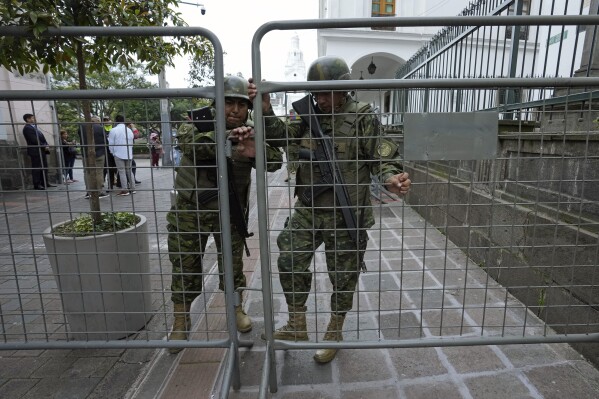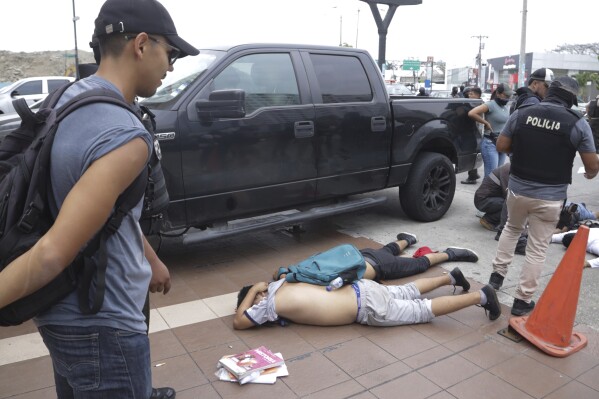What we know about ‘Fito,’ Ecuador’s notorious gang leader who went missing from prison
QUITO, Ecuador (AP) — José Adolfo Macías Villamar, leader of Los Choneros, one of the Ecuadorian gangs considered responsible for a spike in car bombings, kidnappings and slayings, was discovered missing from his prison cell where he was serving a sentence for drug trafficking.
Macías began serving a 34-year sentence in 2011, but his prison stays have been in style and comfort.
His disappearance Sunday led the government to declare a state of emergency that involved sending the military into prisons, which sparked a wave of at least 30 attacks around the South American country, including an assault at a television station in Guayaquil.
The brazen raid of the station while it was broadcasting a newscast live Tuesday stunned Ecuadorean TV viewers who saw 15 minutes of gang members waving guns, threatening staff and claiming they had bombs. It also led President Daniel Noboa to declare that the country had an “armed internal conflict.”



Macías, who is known as “Fito,” was born 44 years ago in Manta, a coastal city in the province of Manabí, where authorities say Los Choneros emerged. Often sporting a beard, wavy hair, protruding belly and heavy build, he has become a recognizable figure in a country traumatized by violence.
Little is known about his humble origins in Manta, but his criminal record is extensive. Robbery, murder, manslaughter, illicit association, organized crime, possession of weapons, attack on life and crime against property are among at least 30 charges against him, according to Ecuador’s judiciary.
He is on Ecuador’s most wanted list and a reward was offered for information leading to his capture.
His mother, Marisol Villamar, says he is innocent.
“He’s being investigated for everything,” she said. “They accuse him of selling drugs, stealing cars and even of stealing chickens. For everything that happens in Manta they want to hold him responsible,” Villamar complained in a 2017 interview published by local newspaper El Diario de Manta.
After the death of Los Choneros’ boss José Luis Zambrano, alias “Rasquiña,” in December 2020, Macías and Junior Roldán were left in charge of the gang but the latter was killed shortly after exiting prison, leaving Macías as its sole leader. Authorities in Ecuador have classified the gang as a terrorist organization.
According to authorities, the group controls the passage of drugs through the Pacific coast and it has links with Mexico’s Sinaloa cartel, to whom it has provided security and logistics services for decades.
Los Choneros originated in the 1990s, and police say it dominates prison pavilions. Until 2020, when Rasquiña died, it controlled other criminal groups. But the death of its initial leader launched a power struggle with rivals such as Los Tiguerones, Los Lobos and Los Chonekillers, who were formerly allies.
Ecuador’s president recently questioned Macías’ prison privileges by saying his cell had more more electric outlets than a hotel room.
“Let’s start with the fact that there shouldn’t be a plug to charge his cell phone or an internet router inside his cell,” Noboa said.
Authorities say Macías likes to be seen and does little to hide the privileges he has enjoyed in prison, almost defying the state by flaunting them in videos and photographs on social media. There are murals with his image inside prisons.
During his stay at La Regional prison, authorities say, he threw parties and had access to forbidden items including weapons, appliances, liquor, fighting cocks and jewelry, among other items. A framed painting shows him in robes, since he graduated as a lawyer in prison. His bathroom was decorated with ceramics.
The prison complex in Guayaquil, about 170 miles (270 kilometers) southwest of the capital, also houses the largest and most dangerous lockup in the country.
From prison, Macías sent recorded messages to authorities and “to the Ecuadorian people.” In his last video, released in July 2023, he appeared surrounded by armed men and a police officer, whose participation authorities said was coerced.
One video clip he appeared in was of a Mexican corrido. He attributed the ballad’s production to his daughter. The so-called “corrido of the lion” starts by calling Macías “the boss of bosses,” “leader of Los Choneros” and “a very good person.”
He is believed to have escaped from his cell before his transfer to a maximum security prison where he would be held in isolation, though no official in Ecuador has used the word “escape.” Authorities refer to his absence from his cell, leaving it unconfirmed whether he actually escaped.
If true, it wouldn’t be the first time he escaped from prison. He previously did it in 2013, but was recaptured.
In an interview Wednesday, President Noboa said Macías was in his cell during roll call the day before at 7 p.m., although he admitted that “it may be that they falsified the list.”
The truth is that they don’t know where Macías is or when or even how he left his cell.
Disclaimer: The copyright of this article belongs to the original author. Reposting this article is solely for the purpose of information dissemination and does not constitute any investment advice. If there is any infringement, please contact us immediately. We will make corrections or deletions as necessary. Thank you.

